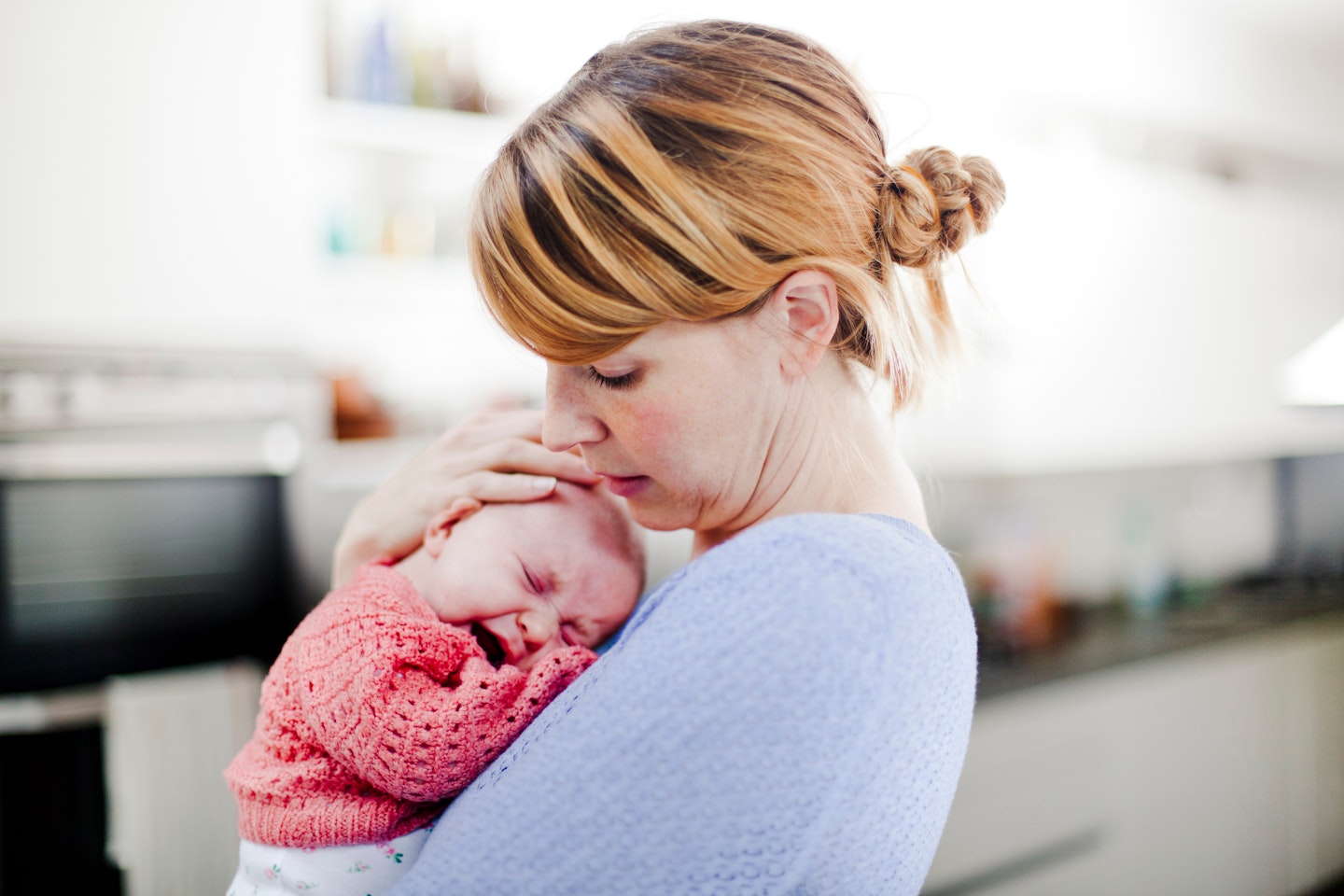Your newborn was a handful.At three months, you’re still exhausted. By six months, you still haven't cracked it AND you've got smushed banana in your hair. Yep, you’ve hit the six-month slump
When my son Tyler was first born, I amazed myself by getting through the demands of looking after a new baby without having a major meltdown. Adrenaline andhormonessomehow kept me buoyant and I managed to stay zen through the hard times of little sleep and cluelessness.
But, at around six months, I suddenly felt overwhelmed. It was the exhaustion and stress – and yes, the enormity of the fact I was actually a mum – catching up with me, and I began to feel frazzled. During the day, I was trying to get my head around weaning, while at night, Tyler was teethingand the regular wake-ups felt worse than ever.

Sharing my mini-meltdown with my mum friends, I imagined they’d all be shocked. After all, our babies were smiling and reaching for toys now – this was the fun bit. But, to my surprise, most of them were going through a similar thing. Far from finding our groove, it seemed some of us had hit a new and unexpected low.
Research shows that, at six months, two-thirds of mums are struggling, while one in six doesn’t properly enjoy their babies until after their first birthday.
Here are 4 reasons, according to science, why you're finding it tough at six months.
1) Well-wishers begin to dwindle

‘Part of the reason why a low at this time is common is that society no longer considers mothers of older babies “special”,’ says Sarah Ockwell-Smith, author of The Gentle Sleep Book.
‘With a newborn, you receive presents, flowers and visits from well-wishers, midwives and health visitors. But, six months later, fewer people ask how you are or visit and the day-to-day reality of being at home with a baby kicks in.’
'Six months on, fewer people ask how you are'
2) Your baby's sleep regresses
To add to this, your baby’s sleep often regresses around now, either due to him being ready for solids, teething or just increased mobility and awareness. And, although you may be getting more sleep than you did in those first few weeks, the previous months will still be taking their toll. ‘The build-up of exhaustion, both physical and mental, can be a real trigger for slumps in mood around six months after birth,’ says consultant perinatal psychiatrist Liz McDonald.
3) Blame weaning
If you’ve recently stopped or cut down on breastfeeding, there’s also a scientific reason behind a six-month low as it prompts a change in hormone levels. ‘Weaning can be associated with worsening mood in some mothers,’ says Dr Samantha Meltzer-Brody, director of the perinatal psychiatry program, at the University of North Carolina.
'Research shows that weaning can trigger mood changes'

When breastfeeding stops, oxytocin levels – which has an anti-anxiety effect – drop as the hormone is no longer needed for lactation. Many women report feeling uptight and anxious as a result.’ Even cutting back on feeds, as your baby moves to solids, can trigger symptoms.
4) Worrying about the future
On top of the hormones and tiredness, there’s a dawning sense that you can no longer put your life on hold (and live in that new baby bubble) and it becomes decision time. That was certainly the case with me. When Tyler napped, instead of relaxing as I had in the early days, I’d be worrying about when to go back to work, childcare, finances…
‘It’s common to find yourself facing big questions about your life and your future as a family, which can cause anxiety,’ says Jona Lewin, consultant psychiatrist for Central and North West London NHS Foundation Trust. Psychotherapist Naomi Stadlen agrees. ‘At around six months, your baby has usually developed enough to enable you to start thinking of yourself a bit more.’ she says. ‘In fact, it’s a brilliant time to take stock and consider your future, but can end up being all too much if you’re not mentally prepared for this new phase.’
And if you are finding it tough, here are some things you can do...
Work through your problems
If you find yourself worrying, channel your thoughts in a constructive way. ‘Set aside time every week to tackle tasks, such as looking into childcare options, but don’t let them dominate your life,’ says Jona. And try to isolate any specific problems that are getting you down, rather than letting everything roll together and overwhelm you. ‘It might be that, for example, your career is a source of concern and you’d feel better after a chat with your boss, or half an hour online considering options,’ he adds.
Most importantly, rather than beating yourself up about not being totally on top of things, cut yourself some slack. ‘A mum of a six-month-old needs to look after herself just as much – if not more so – than a mum of a six week old,’ says Sarah. ‘For half a year, you will have been so busy nurturing your baby that you may have forgotten to nurture yourself. But it’s vital to eat well, get plenty of rest and recharge your batteries whenever possible.’
Get mum support
For mums caught up in the perfect storm of cumulative tiredness, hormonal havoc and high expectations, finding support should be a priority. ‘Whether you turn to mum friends, your family or your GP, the first step to overcoming a six-month slump is admitting you’re actually having one,’ says Sarah.
If it threatens to tip over into something more serious – for example, you persistently feel sad, fatigued, irritable or can’t enjoy anything, including your baby – make sure your doctor rules out postnatal depression. ‘Some mothers find a proper diagnosis is missed in all the turmoil of the birth and the early days with a newborn,’ says Sarah.
As long as it’s not PND, Liz advises dealing with your slump head-on by getting regular fresh air and socialising more. ‘Make sure you have an activity booked in at least once a day, so you get out of the house,’ she says. ‘If you don’t know where to start, sign up with your local children’s centre, which will have information on mother-and-baby groups.’
Remember, this stage will pass
‘As babies start to sleep better and you both get the hang of weaning, plus your hormones settle, you’ll be able to deal with things more easily,’ says Sarah.
Now Tyler’s nearly 16 months old, and I’ve learned that it’s OK to have days that feel like a struggle and to be uncertain that I’m doing everything right. Most of all, my six-month slump taught me an important parenting lesson – that it’s always better to air fears and frustrations than to let them fester.
When did you feel like having your baby felt more manageable? Let us know on Twitter and Facebook! And Make sure you're following Mother & Baby on Instagramfor relatable memes, inspiring stories and parenting hacks!
Read next on Mother&Baby:
-
Need to talk to someone? Here’s how to get help when you need it
-
I’m a first time mum needing extra mental health support - and I’m not ashamed
Why not join thousands of mums and start your very own Amazon Baby Wish List? They're absolutely free to create and perfect to send to your family, friends, and colleagues
Join our Facebook group called #mumtribe. Simply search ‘#mumtribe’ into the search bar and meet like-minded mums, win gorgeous goodies and have some fun!
